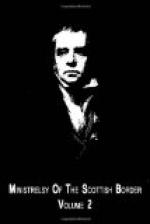[Footnote A: See an account of this desperate duel in the Guardian.]
The sufferers in this melancholy affair were both men of high birth, the heirs apparent of two noble families, and youths of the most promising expectation. Sir James Stuart was a knight of the Bath, and eldest son of Walter, first lord Blantyre, by Nicolas, daughter of Sir James Somerville, of Cambusnethan. Sir George Wharton was also a knight of the Bath, and eldest son of Philip, lord Wharton, by Frances, daughter of Henry Clifford, earl of Cumberland. He married Anne, daughter of the earl of Rutland, but left no issue.
The circumstances of the quarrel and combat are accurately detailed in the ballad, of which there exists a black-letter copy in the Pearson Collection, now in the library of the late John duke of Roxburghe, entitled, “A Lamentable Ballad, of a Combate, lately fought, near London, between Sir James Stewarde, and Sir George Wharton, knights, who were both slain at that time.—To the tune of, Down Plumpton Park, &c.” A copy of this ballad has been published in Mr Ritson’s Ancient Songs, and, upon comparison, appears very little different from that which has been preserved by tradition in Ettrick Forest. Two verses have been added, and one considerably improved, from Mr Ritson’s edition. These three stanzas are the fifth and ninth of Part First, and the penult verse of Part Second. I am thus particular, that the reader may be able, if he pleases, to compare the traditional ballad with the original edition. It furnishes striking evidence, that, “without characters, fame lives long.” The difference, chiefly to be remarked betwixt the copies, lies in the dialect, and in some modifications applicable to Scotland; as, using the words "Our Scottish Knight." The black-letter ballad, in like manner, terms Wharton "Our English Knight." My correspondent, James Hogg, adds the following note to this ballad: “I have heard this song sung by several old people; but all of them with this tradition, that Wharton bribed Stuart’s second, and actually fought in armour. I acknowledge, that, from some dark hints in the song, this appears not impossible; but, that you may not judge too rashly, I must remind you, that the old people, inhabiting the head-lands (high grounds) hereabouts, although possessed of many original songs, traditions, and anecdotes, are most unreasonably partial when the valour or honour of a Scotsman is called in question.” I retain this note, because it is characteristic; but I agree with my correspondent, there can be no foundation for the tradition, except in national partiality.
THE DUEL OF WHARTON AND STUART.
PART FIRST.
It grieveth me to tell you o’
Near London late what did befal,
’Twixt two young gallant gentlemen;
It grieveth me, and ever shall.




